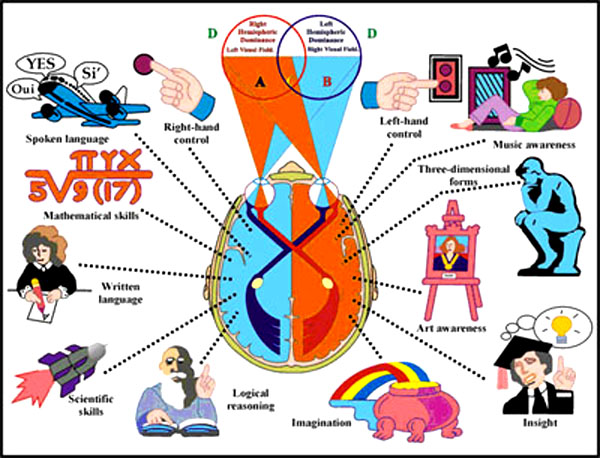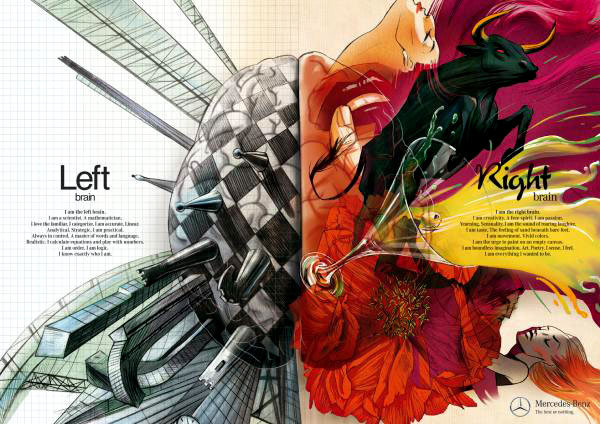Split Internet Hypothesis
Didn’t you know social media is bad for you? According to a study of Facebook and MySpace presented at the 119th Annual Convention of the American Psychological Association, “young adults who have a strong Facebook presence show more signs of other psychological disorders, including antisocial behaviors, mania and aggressive tendencies,” and lower grades in school. Also, “daily overuse of media and technology has a negative effect on the health of all children, preteens and teenagers by making them more prone to anxiety, depression, and other psychological disorders, as well as by making them more susceptible to future health problems.”
Whew. I’m glad they didn’t mention Twitter. Twitter’s still safe.
“While nobody can deny that Facebook has altered the landscape of social interaction,” cautioned Professor Larry Rosen of California State University, “We are just now starting to see solid psychological research demonstrating both the positives and the negatives.”
Wait. So the dangers of Twitter might be next on the horizon? Egad.
Before everything on the internet is outlawed as harmful, I have an observation to explore concerning our inherent susceptibility to the two giants of social media; Twitter and Facebook. I’m speaking of myself, because I grew up being taught the idea of people being Right-brain or Left-brain dominant.
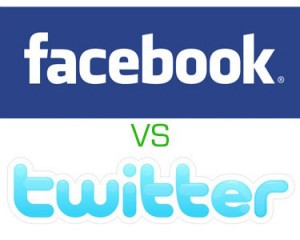 The venerable Scholastic Books put the theory like this; “If you are right-brain dominant, it is your intuitive, emotional right hemisphere that guides the decisions you make throughout the day. If you are left-brain dominant, it is your sequential, time-oriented left hemisphere which tells you how to think, what to believe, and what choices to make.”
The venerable Scholastic Books put the theory like this; “If you are right-brain dominant, it is your intuitive, emotional right hemisphere that guides the decisions you make throughout the day. If you are left-brain dominant, it is your sequential, time-oriented left hemisphere which tells you how to think, what to believe, and what choices to make.”
“Split Brain Theory,” based on the “split brain” research of the 1960s, was taught and editorialized years after its inception and began to sound like this, according to John McCrone of The New Scientist: “The left cerebral hemisphere is supposed to be the coldly logical, verbal and dominant half of the brain, while the right developed a reputation as the imaginative side, emotional, spatially aware but suppressed. Two personalities in one head, Yin and Yang, hero and villain.”
Think of it like The Matrix. Mr. Smith, the autocratic, megalomaniacal construct is the left brain. Mouse—what, you’d thought I’d mention Neo? No, he’s a tool—Mouse, creator of the red-dress girl, is the right brain.
You could call my observation the “Split Internet Hypothesis.” Twitter and Facebook, the two dominant social media platforms are the Yin and Yang, the Smith and Mouse, the Left and Right Brains of the internet. Are they the hero and villain of the internet? That remains to be seen.
The Black Left Hand of Twitter
 Twitter’s Left Brain Dominance and Facebook’s Right becomes even more clear when including a recent study by two European clinical neurologists, to the classic interpretation of split brain research.
Twitter’s Left Brain Dominance and Facebook’s Right becomes even more clear when including a recent study by two European clinical neurologists, to the classic interpretation of split brain research.
“The left brain,” they said, “is focused on detail. This would make it the natural home for all those mental skills that need us to…fix on a particular fragment of what we perceive…” The Left is the more detail oriented of the pair, like Twitter. The social media nexus launched on July 15, 2006 and “now claims tens of millions of users worldwide. It is one of the most popular online activities among tech enthusiasts and has become a widely used tool among analysts to study the conversations and interests of users, buzz about news, products or services, and announcements by commercial, non-profit, and government organizations,” as accounted for by Pew.
Twitter is also the more self-contained, as Facebook is all about who “likes” or comments on your posts, and Scholastic would agree that solo posting is much more left-brain since, “left-brain students prefer to work alone. They like to read independently and incorporate research into their papers. They favor a quiet classroom without a lot of distraction.”
Confirm Friend Request?
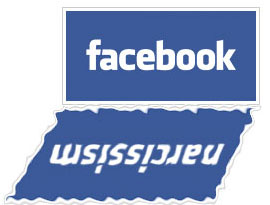 Love to click that “like” thumbs up? Gotta throw your LOL at a pal’s video of his kid committing a random act of cuteness? Truly eager to commit to the flea market/bake sale/BBQ of your digital BFF? Then Facebook is your friend and it’s your brain’s fault. You “prefer to work in groups…like to do art projects, industrial arts electives in middle school and graphic design [and] would prefer to design and make a mobile rather than write ‘another tedious term paper.” You, Facebook junkie, are Right Brian Dominant. With over 500 million users worldwide, you’re not alone, as published in the journal of Cyberpsychology, Behaviour and Social Networking. Yes, they have one of those. No, I don’t know if it has a fan page.
Love to click that “like” thumbs up? Gotta throw your LOL at a pal’s video of his kid committing a random act of cuteness? Truly eager to commit to the flea market/bake sale/BBQ of your digital BFF? Then Facebook is your friend and it’s your brain’s fault. You “prefer to work in groups…like to do art projects, industrial arts electives in middle school and graphic design [and] would prefer to design and make a mobile rather than write ‘another tedious term paper.” You, Facebook junkie, are Right Brian Dominant. With over 500 million users worldwide, you’re not alone, as published in the journal of Cyberpsychology, Behaviour and Social Networking. Yes, they have one of those. No, I don’t know if it has a fan page.
The right brain is great at seeing “the broad, background picture…general connections,” and “the emotional and metaphorical aspects of speech,” wrote McCrone. Which sounds like Facebook to me, especially when you include that Righty is “best able to represent the relative position of objects in space.” That totally sounds like all those “Hey, look, I’m over here!” apps like Foursquare.
But, KILL the BAD GUY, Neo! Which one is the BAD GUY?!
“There is no spoon.”
-That Bald Kid, The Matrix
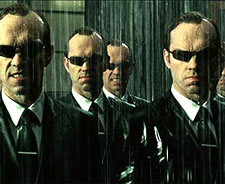 Look, this Richard Smith guy, bestselling author and founding CEO of “one of the world’s most influential senior executive networking companies” says that “achievement in almost any area of life is heavily dependent upon other people…and the “weak ties” of social media “are almost always more valuable to us than strong ties.” He goes further out on the internet utopia limb by declaring that “our species has strived for millions of years in pursuit of increased ability to manage social networks. The advent of Facebook and other social media tools, and the resulting explosion in our capacity to manage and benefit from larger and larger social circles may very well be one of the most important outcomes of the digital age.”
Look, this Richard Smith guy, bestselling author and founding CEO of “one of the world’s most influential senior executive networking companies” says that “achievement in almost any area of life is heavily dependent upon other people…and the “weak ties” of social media “are almost always more valuable to us than strong ties.” He goes further out on the internet utopia limb by declaring that “our species has strived for millions of years in pursuit of increased ability to manage social networks. The advent of Facebook and other social media tools, and the resulting explosion in our capacity to manage and benefit from larger and larger social circles may very well be one of the most important outcomes of the digital age.”
But Lady Susan Greenfield, neuroscientist, baroness, professor of pharmacology at Oxford University, and director of the Royal Institution of Great Britain said that “social networking sites remind her of the way that ‘small babies need constant reassurance that they exist’ and make her worry about the effects that this sort of stimulation is having on the brains of users.” She also went further onto the luddite limb, declaring to the Daily Mail that “My fear is that these technologies are infantilizing the brain into the state of small children who are attracted by buzzing noises and bright lights, who have a small attention span and who live for the moment.”
Sorry Neo, there is no bad guy. The rigid Left Brain and the artistic Right Brain are not at war; they strive for balance. “In a neat and complementary division of labor, one side of the brain thought and saw in wide-angle while the other zoomed in on the detail,” McCrone said. Over the human lifetime, “a smart brain became one that simultaneously grasped both the foreground and the background of the moment.”
While it serves the purpose of this dialogue to brand Twitter as Left Brain and Facebook as right, the ultimate fulfillment of internet wholeness is to exist on both networks—and more—to suit your passions or pursuits.
But, not Google+. C’mon. They’re like Philistine Barbarians over there. I asked Quora, I know.

